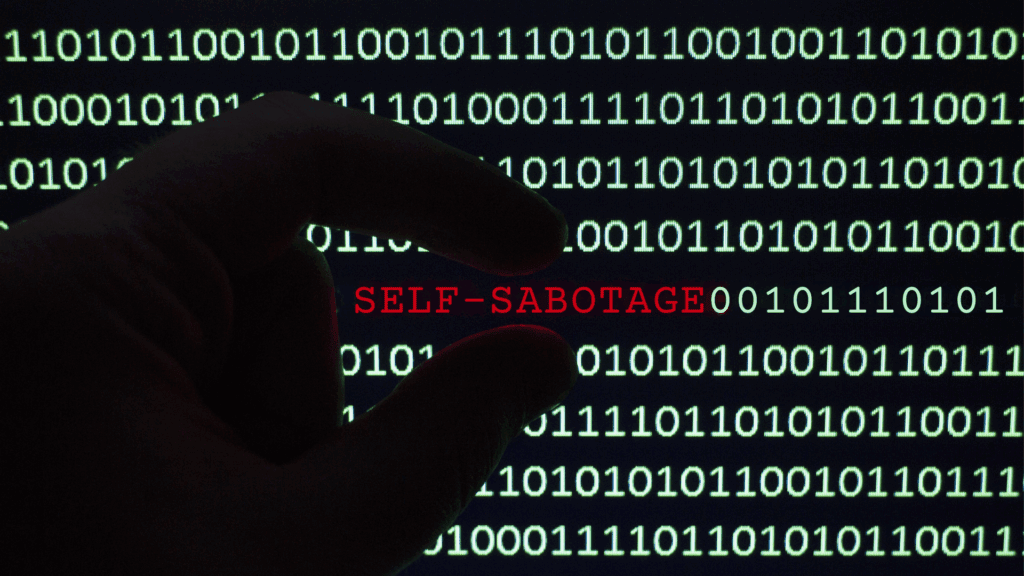Are We Our Own Grave Digger’s?
Have you ever wondered why you sometimes act against your own best interests, especially in relationships or while pursuing personal goals? Or why do we self-sabotage in the first place? This perplexing behavior, known as self-sabotage, is where our actions often contradict our intentions, leading to outcomes we neither desire nor deserve. By exploring the neuroscience behind these behaviors and understanding the role of self-awareness, we can begin to dismantle the barriers we unknowingly erect against our success.
I am often asked “what is self-sabotage”, “what causes self sabotage” and “what are the signs of self-sabotage”, the answer I typically will give is that self-sabotage is deeply rooted in an internal conflict within our neurobiology. Our brain’s complex wiring often pits emotional instincts against rational decision-making, creating a battleground within us. The limbic system, which governs emotions and survival instincts, frequently overrides the prefrontal cortex, responsible for rational thinking and planning. This imbalance can lead to impulsive decisions that sabotage long-term goals. For instance, in relationship self-sabotage, the fear of vulnerability or rejection may trigger behaviors that push partners away, even when the desire for connection is strong.
Understanding what causes self-sabotage, our relationship self sabotage, and how it manifests, particularly in relationships, is crucial for overcoming these tendencies. Self-awareness emerges as a powerful tool in this battle, enabling us to recognize and address the unconscious biases and fears that drive self-sabotaging behaviors.
By fostering self-awareness and adopting healthier coping mechanisms, we can overcome our inner saboteurs and achieve our full potential. Let’s delve deeper into how self-awareness can help manage these emotional triggers and explore strategies to break free from the cycle of self-sabotage.
Understanding Internal Conflict
The brain’s architecture plays a crucial role in self sabotage. The limbic system, responsible for emotions and survival instincts, often overrides the prefrontal cortex, which governs rational thinking and decision-making. This imbalance can lead to impulsive actions that undermine long-term goals. The limbic system, including structures like the amygdala, triggers fear and anxiety, leading to avoidance behaviors. In self sabotage, this system may prioritize immediate emotional relief over long-term benefits, causing us to act against our best interests.

The Role of Self-Awareness
Self-awareness is vital in understanding and mitigating self sabotage. It influences how we perceive and react to our thoughts, emotions, and behaviors. When self-awareness is lacking, individuals may unknowingly engage in self-sabotaging behaviors driven by unconscious biases and fears.
How Self-Awareness Influences Self Sabotage
- Recognizing Counterproductive Patterns: Self-awareness allows individuals to identify and understand behaviors that are counterproductive. Without this awareness, people may continue actions that undermine their goals, such as procrastination or avoidance, without realizing their impact.
- Emotional Regulation: High self-awareness helps individuals manage their emotions effectively. When emotions are not regulated, they can lead to impulsive decisions that are detrimental to personal and professional goals. For example, fear of failure might cause someone to avoid taking necessary risks.
- Alignment with Personal Values: Self-aware individuals can align their actions with internal values and standards. This alignment helps prevent cognitive dissonance, where actions conflict with beliefs, leading to discomfort and self sabotage as a means to resolve that discomfort.
- Conflict Management: In situations of conflict, self-awareness helps individuals recognize their emotional triggers, self sabotage habits and biases. This awareness can prevent escalation and promote constructive resolution, rather than destructive behavior that could harm relationships and personal growth.
How Can Self-Awareness Help in Managing Emotional Triggers?
Self-awareness is key in identifying and managing emotional triggers. By understanding what prompts emotional reactions, individuals can develop strategies to cope with these triggers effectively. This might involve pausing to reflect before reacting, employing relaxation techniques, or reframing negative thoughts, ultimately reducing impulsive actions that lead to self sabotage.
Psychological Factors in Self-Sabotage
Psychologically, self sabotage is linked to low self-esteem and fear of failure. These feelings can manifest as procrastination, perfectionism, or avoidance. Understanding these psychological triggers is essential for overcoming self-sabotage.
How Can Low Self-Esteem Lead to Self-Sabotaging Behaviors?
Low self-esteem often manifests as a lack of confidence in one’s abilities, which can lead to self sabotage. Individuals might engage in negative self-talk, set unrealistic goals, or avoid challenges altogether. This behavior serves as a defense mechanism to protect against perceived failure or rejection, reinforcing a cycle of self-doubt and underachievement.
- Perfectionism and Avoidance: Perfectionism can lead to self sabotage by setting unattainably high standards. When these standards are not met, individuals may abandon tasks altogether. Similarly, avoidance behaviors prevent engagement with challenging tasks, leading to missed opportunities.

Overcoming Self Defeat
Breaking the cycle of self sabotage requires a conscious effort to align actions with goals. This involves increasing self-awareness, challenging negative thought patterns, and developing healthier coping strategies.
- Enhancing Self-Awareness: Self-awareness involves recognizing self-sabotaging behaviors and understanding their triggers. Mindfulness practices can enhance self-awareness, allowing individuals to observe their thoughts and actions without judgment.
- Challenging Negative Thoughts: Identifying and challenging negative thoughts is crucial for overcoming this cycle of self deprication. Cognitive-behavioral techniques can help reframe these thoughts, promoting a more positive and proactive mindset.
- Developing Healthy Coping Strategies: Replacing self-sabotaging behaviors with healthier alternatives is essential. This may involve setting realistic goals, breaking tasks into manageable steps, and seeking support from others.
Embracing Change
Understanding the neuroscientific and psychological underpinnings of self sabotage can empower individuals to break free from self-defeating behaviors. By fostering self-awareness and adopting healthier coping mechanisms, we can overcome our inner saboteurs and achieve our full potential.
The Neuroscience of Self-Sabotage:
- Your brain’s negativity bias, a survival mechanism, can trap you in cycles of self-defeat
- Stress hormones like cortisol reinforce these patterns, making change feel impossible
- But neuroplasticity – your brain’s ability to form new connections – offers hope
Breaking Free:
- Awareness: Recognize your self-sabotage behavior
- Interrupt: Challenge negative thought patterns in real-time
- Rewire: Create new, empowering neural pathways through consistent positive actions
From My Chair: Overcoming Self Sabotage For Good
My clients have transformed their lives by understanding and applying these neuroscientific principles. From skyrocketing careers to fulfilling relationships, the possibilities are limitless when you stop digging your own grave and start building your empire.
Ready to harness your brain’s potential and learn what the opposite of self-sabotage is? It’s time to trade in that shovel for a blueprint of success. Your brain is waiting to be rewired – are you ready to flip the switch?
, , , , , , , , ,













